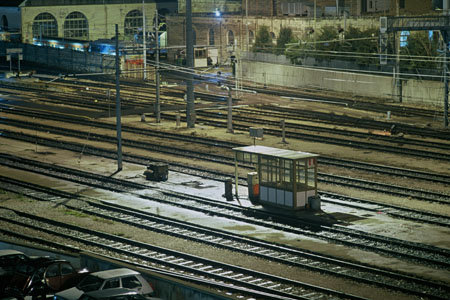Eclipses du reel
dal 2/11/2006 al 23/12/2006
Segnalato da
2/11/2006
Eclipses du reel
Fri Art - Kunsthalle Fribourg, Fribourg
Exploring worlds between image and sound, fiction and reality, the visible and the invisible, the works of Peter Aerschmann, Sven Augustijnen, Ryan Gander and Marco Poloni attempt to probe through simulation the irreversible loss of meaning and communication linked to the disappearance of critical thinking and to the rise of certain forms of censorship.

Peter Aerschmann, Sven Augustijnen, Ryan Gander and Marco Poloni
This exhibition, entitled Eclipses du reel, eclipses of reality, aims at investigating our
modes of cognitive and sensory perception while highlighting aesthetics of
disappearance in an alienating world.
Exploring worlds between image and sound, fiction and reality, the visible and the
invisible, the works of Peter Aerschmann, Sven Augustijnen, Ryan Gander and
Marco Poloni attempt to probe through simulation the irreversible loss of meaning
and communication linked to the disappearance of critical thinking and to the rise of
certain forms of censorship. E'clipses du re'el is an exhibition which attempts to
stimulate the viewer by combating the erosion and desertification of a world which
hides and disguises its commitments under a blanket of deception and pretence.
Marco Poloni pursues this investigation in an identity-based quest in two works, The
Desert Room (2006), a series of photographies, and an installation, The Desert Hotel
(2006). The first version of The Desert Room was organised by Pierre-Andre' Lienhard
at Plug In in Basel in 2005. The artist subsequently revised it for Fri-Art, by including
as well other interfaces. In a recently published article, Lienhard writes: “The Desert
Room is not only an apparatus which offers an observation anchored in our reality as
visitors, it is also a backdrop which plunges us into double-decker fiction. The
computer and the TV SET evoke the context of current media manipulation." The
room is an accurate reconstruction of the room inhabited by the reporter Locke in a
hotel in the North-African desert in the film The Passenger (Profession: Reporter),
shot by Antonioni in 1973. Film and its procedures are a recurring reference for
Poloni. This film, particularly so, since it deals with perception enclosed in borrowed
visions. In this hotel room, Locke, trades his identity against that of an arms dealer,
found dead in a neighbouring room. He escapes the truth of his failure with the
camera, to completely lose himself in the fiction of a new self.
The room in the
desert is also a room which has been deserted. The disappearance of the reporter is
echoed by the disappearance of our image on the screen. The Desert Room
establishes a mirroring effect between different levels of fiction and reality. The
figure of the reporter is one of these mirrors; it embodies our position as an
observer of reality in constant interaction with fiction. Our absence within the image
frees us from all figurative expression and allows us to explore semi-transparencies
between these levels. Passengers of the infrathin, we are summoned to perceive
ourselves as perceiving."
Theatrum Mundi (2006) by Peter Aerschmann is an interactive installation which
ties in with the tradition of the stage arts, converging not only on the void, but also
on the vanity of the human comedy. The artist makes use of two projections to
confront two closed worlds in a polarized new world order. One transcribes live feed
information and news downloaded on the Internet through press agencies such as
Reuters or Swissinfo in real time. The other focuses on day-to-day life in all its
mundane aspects taken from normal life.
The First Grand National (2003) by Ryan Gander at first plunges the viewer into a
dark room. Then, confronted by a first sensory reduction, the subject-perceiver
furtively discovers the colour bar of a TV screen projected against the wall of a space
circumscribed by a sound system. The position of the monitor - a plain BRIONVEGA
“algol", designed by Zanuso and Sapper in 1964 - is inverted and diffuses a colour
bar which transposes a reduced representation of the world in true colors. With this
work, the artist aims to overstep the monitor’s original function by validating not
only its material quality, but also its ideal, nonexistent image. This unreal matrix is
coupled with a feminine voice, which narrates the transition from radio to television
and focuses on the issue of memory.
With stringent irony and sharp criticism, Sven Augustijnen draws in L’e'cole des
Sven
pickpockets (2000) a doomed world, in which the victim is no longer prey to his
predator. On the contrary, the disappearance of the object becomes the act of a
pickpocket, reenacted by a magician. The reversal of a situation through magic
supplants reality and uncovers an inscrutable world.
This exhibition is an existential meditation about the impossibility of knowing reality
and accepting the unbearable precariousness of the world. Does the viewer not
become both actor and observer, confronted with his own incapacity to embrace a
world that is both real and unreal? By disappearing, do eclipses perhaps reveal and
denounce a hidden reality?
Image: Marco Poloni, from Shadowing the Invisible Man, shooting script for a short film, 2001. Color photographs mounted on aluminium, each 8 1/8 x 10 5/8 in.
Opening, November 3 at 6:30 pm
Fri-Art
Petites-Rames 22 - Fribourg
Opening hours : Tuesday-Friday 14-18h, Saturday-Sunday 14-17h, Thursday evening 18-20h
Guided visits : Thursday, November 9 and 23, 2006 at 19h and by reservation



